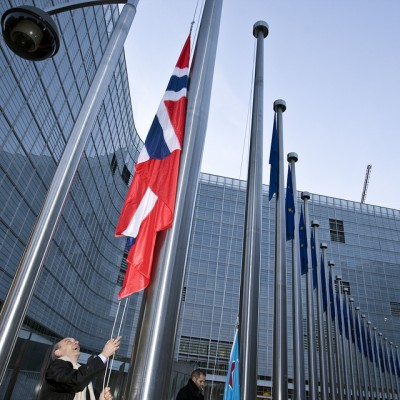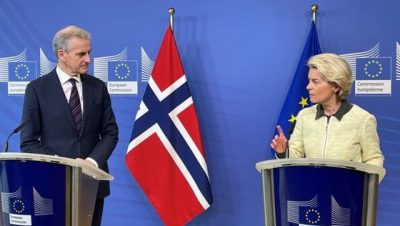NEWS ANALYSIS: Rarely do the Norwegian government and opposition parties in Parliament mount such a united front as they have since Russia invaded Ukraine last week. Norway and the EU have also pulled together so quickly and so firmly that some are seizing the opportunity to urge Norway to finally join the EU.

“What has the last week shown?” wrote newspaper Aftenposten’s political editor Kjetil B Alstadheim over the weekend. “That security lies in fellowship with our closest allies.”
Norway is a founding member of NATO but has never joined the EU. It’s thus been left to merely attach itself to EU initiatives and proclamations, most recently regarding Russia’s roundly condemned invasion of Ukraine. Norway has little if any role in forming EU policy, since it has rejected EU membership twice, in 1972 and 1994.
A crisis like the one now dramatically unfolding in Ukraine may prompt some Norwegians to reconsider. There’s safety in numbers, and Norway alone, despite its wealth, doesn’t have anywhere near the power the EU does. Alstadheim, long a prize-winning journalist and political expert in Norway, suggests it’s time to end the country’s long existence of being on the “outside” of collective European policy and instead be able to contribute as a full-fledged member.
Moving beyond observer status
When the EU, for example, discussed and quickly adopted tough sanctions against Russia last Thursday night, Norway was merely an observer. Prime Minister Jonas Gahr Støre had claimed beforehand that Norway would go along with whatever the EU decided.
“That was wise,” Alstadheim wrote, “but shouldn’t Norway be sitting around the table when such decisions are made?” He clearly thinks so, not least when EU member countries have so swiftly and resolutely put aside characteristic quarreling and acted in a remarkably unified manner during the Ukrainian crisis. Never before have major and expensive decisions been made so quickly, prompting another commentator for state broadcaster NRK to claim that the EU is now emerging as a new “superpower” of its own. Under the leadership of EU Commission President Ursula von der Leyen, things are happening much more quickly than anyone could have expected, not least Russian President Vladimir Putin. He’s now widely believed to have underestimated the power of a clearly united EU, and a united NATO, too.

The bottom line is that Russia’s attacks on Ukraine are also viewed as attacks against Europe itself, leading to new and more uncertain times ahead. NATO’s Norwegian leader Jens Stoltenberg has already dubbed it “the new normal” and it’s unleashed debate in Sweden whether Sweden (which joined the EU nearly 30 years ago) should also join NATO. “In Norway,” wrote Alstadheim, “it should be part of a new EU debate.”
Norway can also benefit from more cooperation with the EU on climate and energy issues, and those regarding another big country that can be as difficult and challenging as Russia: China. Lithuania benefited from its EU ties and support when China plagued it recently, while Norway has largely had to face its struggles with China alone.
Prime Minister Støre himself has long favoured EU membership, but been forced to suppress it for the sake of unity within his Labour Party’s government coalition with the firmly anti-EU Center Party. “It can’t be natural that Norway, as the only country in Europe, doesn’t discuss the question of full participation in the European cooperation,” Støre, a longtime diplomat, wrote back in 2002. Alstadheim, citing Støre’s quote in his commentary, stresses that the need for such discussions is even greater now regarding Norwegian preparedness, protection of Norwegian and European values and fellowship with close neighbours and allies.
There was, meanwhile, virtually no debate at all in Norway as to whether the Norwegian government should attach itself to the EU’s tough sanctions against Putin and his accomplices. The Norwegian Parliament was as unified and responded as firmly as the EU had. The US, Canada and other countries have also joined in to punish Putin. Major Russian banks have been blocked, making it much tougher for Russians to conduct business and trade.
The sanctions will also be expensive for the countries imposing them, but “it’s worth the price,” editorialized newspaper Dagsavisen on Saturday. So did most all other Norwegian media, with Aftenposten specifying that “President Putin alone” bears all the blame for the war he started “to demilitarize” Ukraine. Aftenposten also ominously warned that it Putin believes his invasion of Ukraine was successful, other countries are vulnerable to being forced into his “sphere of influence,” too.
“This is a fight for the future of democracy,” declared another Norwegian political commentator, Hege Ulstein, over the weekend. She went so far as to suggest that a much bigger political drama is playing out behind the invasion of Ukraine.
Ulstein reminded readers of newspaper Dagsavisen, for example, that it was the wealthy Ukrainian businesswoman and later president, Julia Timosjenko, who first wanted Ukraine to join both the EU and NATO in the early 2000. She narrowly lost the 2010 election, though, to Putin supporter Viktor Janukovitsj, who’d won support from none other than the US lobbyist Paul Manafort, who in turn became one of Donald Trump’s most important supporters. Manafort got into trouble over allegations of Russian interference in the 2016 US presidential election that Trump narrowly won over Hillary Clinton. Trump later allegedly and famously threatened to withhold US foreign aid to Ukraine unless authorities there turned over allegedly damaging information tied to business conducted by his opponent Joe Biden’s son.
It was the current Ukrainian President Volodymyr Zelenskii, Ulstein noted, who stood up to Trump in that case, and now Putin has invaded Ukraine to topple Zelenskii and his government. Trump, meanwhile, was recently quoted as making flattering remarks about Putin’s maneuvering.
“The war in Ukraine is a tragedy,” wrote Ulstein, stressing how it’s important to see the bigger picture, too. “What happens in Ukraine doesn’t stay in Ukraine,” she wrote, adding that Putin’s war can have “enormous, global political consequences.” She quoted the EU’s Leyen as saying that Putin’s goal isn’t only the eastern regions of Ukraine, or Ukraine itself, but “the stability in Europe and the entire international peace.”
There’s no question how Putin’s aggression has unleashed strong and immediate reaction within European countries and within the EU. And within Norway, where every single political party represented in Parliament from the Reds on the far left to the Progress Party on the far right didn’t hesitate to condemn Putin’s invasion of Ukraine. “This is a grave and unacceptable violation of the rule of law,” declared Reds leader Bjørnar Moxnes. Progress’ leader Sylvi Listhaug, usually at odds with Moxnes, firmly agreed: “Ukraine has the right to decide its own future. Russia alone will be held accountable for deaths and damage that its attacks will cause. This is terrible … for Ukraine, Europe and the world.”
It may all lead to countries like Sweden and Finland having a greater need to orient themselves towards NATO, Ulstein wrote, while Alstadheim hopes it will orient Norway more towards the EU. A new generation of young Norwegians has also been seeking a voice on the matter, since the last vote against EU membership was back in 1994. With nearly 30 years of peace in Europe now “shattered” by Putin, as Stoltenberg put it, it may well be time to reconsider.
newsinenglish.no/Nina Berglund

